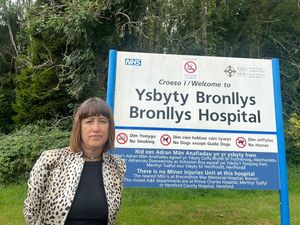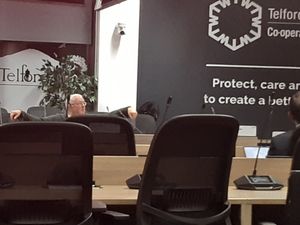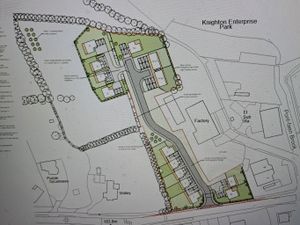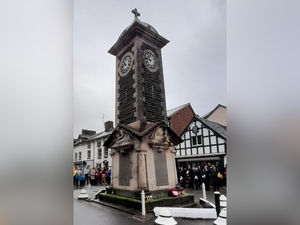Brexit storm: Defiant MPs turn backs on isolated May
Theresa May says she is staying put – as support from her own MPs continues to crumble.
The Prime Minister faces a vote of no confidence following a backlash over the Brexit agreement she brokered.
Eurosceptic North Shropshire MP Owen Paterson today led the criticism, accusing Mrs May of a “grotesque breach of promise”.
He added: “This is not what people voted for. I don’t think that Parliament will vote this through.”
Following a flurry of ministerial resignations, Jacob Rees-Mogg – a former parliamentary candidate for The Wrekin constituency and an ally of Mr Paterson – sent a letter to the Conservative Party’s 1922 Committee calling for her to face a vote of no confidence.
If another 47 letters are sent by MPs, a no confidence vote would be triggered. No Shropshire MPs are believed to have yet written a letter, but they are among Tory figures speaking critically of their leader.
See also:
Mr Paterson, a member of the European Research Group led by Mr Rees-Mogg, launched a withering attack on the deal agreed between the Government and the EU negotiating team.
The former cabinet minister praised Dominic Raab for his resignation as Brexit Secretary over the deal he had been involved with negotiating.
Mr Paterson said: “The proposed deal is so bad it cannot possibly proceed. It totally fails to deliver manifesto pledges to leave the Single Market, Customs Union and European Court of Justice.
“It creates separate arrangements for Northern Ireland, breaching the Belfast Agreement and leaves the UK unable to exit unilaterally.”
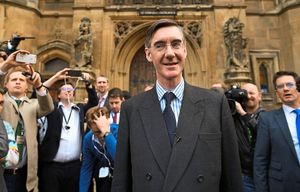
Mr Paterson, who was in Washington last night, said he had not sent a letter calling for a no-confidence vote in the Prime Minister, but declined to comment further, saying it would not be appropriate while he was out of the country.
Telford MP Lucy Allan, who campaigned to leave the EU in the 2016 referendum, said she could not support the deal.
“I respect the Prime Minister for doing an impossible job in the most difficult of circumstances. I cannot, however, support the deal that she has negotiated,” she said.
“My loyalty is to those who elected me to represent them. Too often their voices are ignored by those in power, too often they are brushed aside and dismissed. It is my job to stand up for them and this is something I am proud to do. The referendum was an opportunity for my constituents to be heard. I cannot stand by while what they said is disregarded.
“I stood for election in 2017 in good faith on a mandate to deliver a Brexit where the UK would leave the single market, the customs union and European Court of Justice. People voted in good faith in both 2016 and 2017 and I have an absolute duty to honour and respect that vote.”
Delivering
But like Mr Paterson, she said she had not sent a letter calling for a leadership contest.
Mark Pritchard, MP for The Wrekin, said Mrs May had lost the confidence of both her party and the wider public.
Ludlow MP Philip Dunne said the important thing was that the Government got on with the job of delivering on its Brexit promise.
“Millions of people up and down this country and tens of thousands of businesses want this House to get on with it,” he said during a debate in the Commons.
He asked the Prime Minister whether Britain would still be bound by EU competition rules governing public sector procurement.
Mr Dunne said he recognised the Government would be bound by EU procurement rules during the course of the implementation period.
But he asked: “Could she give me some indication as to whether we will be taking back control of our own procurement in this country?”
Mrs May replied: “Yes, we’re developing a framework for our own procurement arrangements.”
Opinions
Glyn Davies, MP for Montgomeryshire, admitted it was looking possible that the Prime Minister could be forced to face a vote of no confidence. But he said that if that happened, he would still be supporting her.
“I don’t think anybody is going to be entirely happy with the deal, they can’t be because there are so many different opinions, and I’m like everybody else in that respect.
“But I will be supporting the deal, I have confidence in the Prime Minister and if it came to a vote of confidence – which it looks as though it might happen – then I would vote for her.”
Shrewsbury’s Daniel Kawczynski, a Brexit supporter, was last night meeting constituency members before revealing how he would react.
Mrs May last night held a press conference in which she emotionally defended her record. Standing before a Downing Street lectern, she said: “I believe with every fibre of my being that the course I have set out is the right one for our country and all our people.”
She added: “Leadership is about taking the right decisions. Am I going to see this through? Yes.”
Matched
In a letter to Sir Graham Brady, chairman of the backbench 1922 Committee, Mr Rees-Mogg said Mrs May’s deal “has turned out to be worse than anticipated and fails to meet the promises given to the nation by the Prime Minister, either on her own account or on behalf of us all in the Conservative Party manifesto”.
His move is expected to be matched by other members of the European Research Group, hugely increasing the chances of Mrs May facing a vote of no confidence in her leadership. It is not known how many letters Sir Graham has received so far, although 15 MPs have publicly declared that they have sent them.
Among the more high-profile names is Nadine Dorries, who said Mrs May’s meeting with the Labour leader had angered many in the party.
“The meeting with Jeremy Corbyn has gone down really badly with those few from my side of the party who were actually still giving her the benefit of the doubt,” she said.
Mrs May’s deal came under fire in the House of Commons, where only a handful of Tories spoke in favour of an agreement thrashed out in 19 months of intensive negotiations.
Mrs May insisted the deal was in the national interest and offered a future relationship with “a breadth and depth of co-operation beyond anything the EU has agreed with any other country”.
In a swipe at her Brexit-backing critics, she said the EU would never accept any agreement which did not involve a “backstop” arrangement to ensure the Irish border remains open.
She said it would be “entirely irresponsible” for the Government to have simply torn up the backstop. “The talks are about acting in the national interest. That means making what I believe are the right choices, not the easy choices,” she said.

